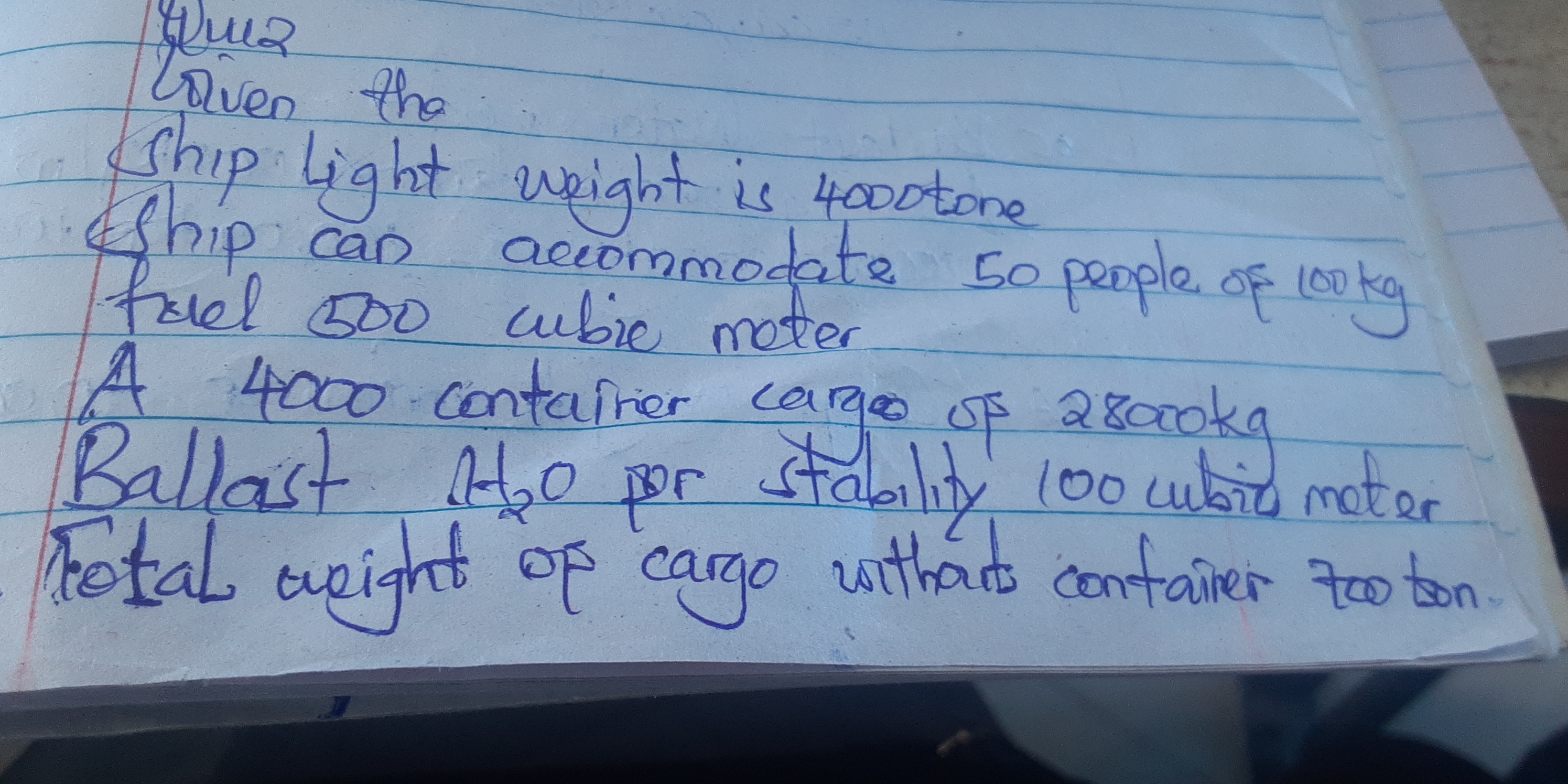Given the ship light weight is 4000 tons, the ship can accommodate 50 people of 100 kg, fuel 500 cubic meters. A 4000 container cargo of 2800 kg. Ballast 40 per stability 100 cubic... Given the ship light weight is 4000 tons, the ship can accommodate 50 people of 100 kg, fuel 500 cubic meters. A 4000 container cargo of 2800 kg. Ballast 40 per stability 100 cubic meter. Total weight of cargo without container 700 tons.

Understand the Problem
The question provides parameters related to a ship's weight, capacity, and cargo specifications, likely to determine the total weight or stability requirements. It involves calculations related to weight distribution and capacity management.
Answer
The total weight of the ship when loaded is approximately $5,132.8$ tons.
Answer for screen readers
The total weight of the ship when loaded is approximately $5,132.8$ tons.
Steps to Solve
- Calculate the weight of passengers
The total number of passengers is 50, each weighing 100 kg. The total weight of the passengers can be calculated as:
$$ \text{Weight of passengers} = 50 \text{ people} \times 100 \text{ kg/person} = 5000 \text{ kg} $$
- Convert the weight of the ship and cargo to the same unit
The light weight of the ship is given as 4000 tons. Since 1 ton = 1000 kg, we convert the ship's weight to kilograms:
$$ \text{Weight of ship} = 4000 \text{ tons} \times 1000 \text{ kg/ton} = 4,000,000 \text{ kg} $$
- Calculate the total weight of the crew and fuel
The weight of the fuel needs to be calculated based on 500 cubic meters. Assuming the density of fuel is approximately 850 kg/m³:
$$ \text{Weight of fuel} = 500 \text{ m}^3 \times 850 \text{ kg/m}^3 = 425,000 \text{ kg} $$
- Calculate the total weight of cargo
The weight of the cargo excluding the container is given as 700 tons. Converting that to kilograms:
$$ \text{Weight of cargo} = 700 \text{ tons} \times 1000 \text{ kg/ton} = 700,000 \text{ kg} $$
- Calculate the weight of the container cargo
The container cargo weighs 2800 kg, and the ballast's weight can be ignored in this context since it contributes to stability rather than total weight.
- Determine the total weight of the ship when loaded
Now we can add all weight components together (the weight of the ship, passengers, fuel, cargo, and container cargo):
$$ \text{Total weight} = \text{Weight of ship} + \text{Weight of passengers} + \text{Weight of fuel} + \text{Weight of cargo} + \text{Weight of container} $$
So,
$$ \text{Total weight} = 4,000,000 \text{ kg} + 5000 \text{ kg} + 425,000 \text{ kg} + 700,000 \text{ kg} + 2800 \text{ kg} $$
Calculating:
$$ \text{Total weight} = 4,000,000 + 5,000 + 425,000 + 700,000 + 2,800 = 5,132,800 \text{ kg} $$
- Convert the total weight back to tons if needed
If you want the total weight in tons:
$$ \text{Total weight in tons} = \frac{5,132,800 \text{ kg}}{1000} = 5,132.8 \text{ tons} $$
The total weight of the ship when loaded is approximately $5,132.8$ tons.
More Information
This calculation includes the weight of the ship, crew, cargo, fuel, and container. Understanding how to convert units and aggregate weights is crucial in maritime logistics.
Tips
- Failing to convert all weights to the same unit before summing them.
- Overlooking the weight of the fuel and its conversion.
- Forgetting to include the container cargo weight in the total calculations.
AI-generated content may contain errors. Please verify critical information